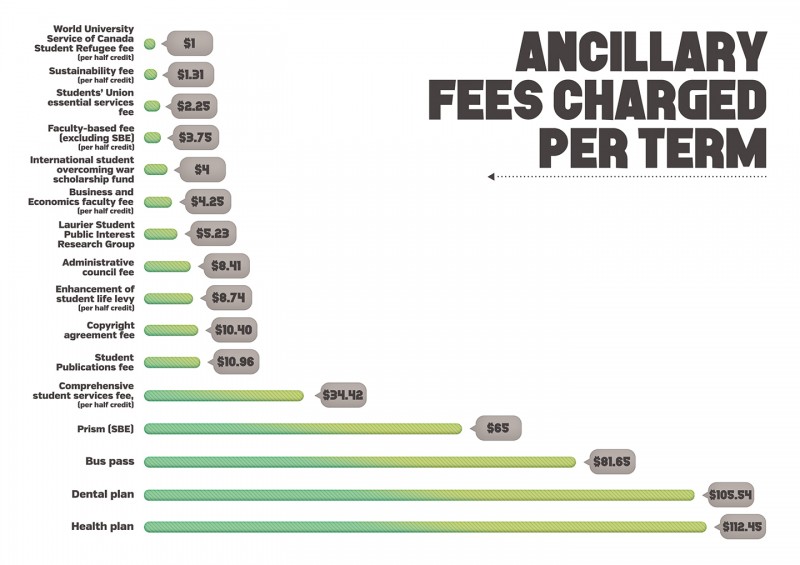Breaking down tuition costs

Lead Reporter Maddy Cutts investigates why students are charged certain fees in addition to tuition costs and where that money goes

Can I opt out?
While all of this can be overwhelming on top of the mandatory tuition costs, it is possible for students to opt-out of certain fees; the health plan and dental plan, priced at $112.45 and $105.54 per year respectively, are placed on all undergraduates’ invoices. These fees, charged only in the fall term, can be removed if you can provide proof of an existing comparable plan. The health plan provides coverage for prescription drugs, specialists such as psychologists or massage therapists, as well as vision care, travel coverage and accidental coverage, among others. The dental plan has coverage for examinations, preventative care and restorative procedures, amongst others.
Prism, a student resource group who charge students within the faculty of business and economics at $65 per term, can also be opted-out of. Alternatively, students from other faculties can choose to pay the fee to gain access to the service, which operates as a tech share similar to the U-Desk. Prism additionally features computer labs, a greater variety of rentable devices, as well as workshops for a variety of computer programs. Students can opt-out of the service at the Prism Help Desk at the beginning of the semester.
The final fee to which students can opt-out is the Laurier Students’ Public Interest Research Group, set at $5.23 per term. This not-for-profit aims to engage students with the field of social change through providing the resources, knowledge and potential opportunities for action. Students can apply to opt-out online within the first two weeks of each term.
Campus and faculty specific
Though the fees listed thus far have been for all Laurier undergraduate students, there are a number of additional fees specific to a campus and even to individual faculties. The Students’ Union building fee, $7.22 per half credit with a cap at $28.88 per term, is to ensure the continual operation of the Fred Nichols Campus Centre, the Students’ Union’s building on the Waterloo campus.
“It’s basically to make sure that the Union breaks even on the Students’ Union building, the FNCC,” said Aitchison. “So that it can still operate, we can keep the lights on, in case for whatever reason we get into a really bad financial state where we can’t use operational funds.”
The enhancement of the student life levy, charged at $8.74 per half credit, is used towards the student life levy fund. This fund is available through application for members of the Laurier community to apply for one-time funding, approved three times a year, for projects which they believe would enhance the student experience at Laurier. These projects have been as varied as repairs to the 24-Hour Lounge, to funding student-led conferences and the Laurier mobile safety app. A student life levy has recently been added to the Brantford campus, as well.
The final fee students at Waterloo pay is a faculty based fee, which is $4.25 per half credit up to $21.25 per term for students in business and economics and $3.75 per half credit capped at $15 for all other undergrads. This money is used to fund the budgets of faculty based clubs, such as those run under the Lazaridis Students’ Society or the Arts Undergraduate Society.
Up and coming fees
There are additionally some new fees which students will soon see appearing on their invoices. At the Students’ Union’s annual general meeting this year, students approved a Students’ Union essential services fee of $2.25, a fee to help fund the Emergency Response Team, Food Bank and Foot Patrol, services deemed “essential” by the Union and university.
“As students are accessing them more frequently and in higher volumes, it becomes harder to sustain on the budgets that we have now. So we’ve seen, specifically on our Brantford campus, more people accessing the Food Bank as of right now, than they did the entire year last year,” Bassett explained. “It makes it so that we are able to better sustain our financial resources, while still being able to offer these essential services to students.”
Proposing fees to enhance student life
To approve all non-tuition fees at Laurier, students vote through referendum, an opportunity for students to have a voice in what services they wish to fund. However, Laurier’s most recent elections voter turnout of 26 per cent indicates the majority of students have not been involving themselves in the process.
New fees can be proposed by anyone, even students, though they are subjected to a rigorous screening process prior to being put to referendum. Though the thought of passing an undergraduate-wide fee may seem impossible, many student-led initiatives, such as the International Students Overcoming War fee, have successfully been voted through, though the involvement of a faculty member is strongly encouraged.
Before being put on a ballot, non-tuition fees must first pass through the non-tuition fee committee, a group comprised of members of the Students’ Union, Graduate Students’ Association and university administration. Laurier’s committee is in place to vet all proposed fees for legality and compliance with university protocol.
Noncompliance with regulations is not uncommon, as indicated this year with two separate referendum questions pertaining to fees which had been flagged as illegally placed. One if these was the faculty of education’s technology fee, used to cover unique technology and software for students to use during their practicums.
“This fee was put forward illegally, without a student vote, they just started charging it,” said Aitchison. “[The new fee is] basically the exact same fee, it’s just that they want the students to have a say, so if it fails it won’t be ever charged again, if it passes it will continue to be charged.”
The fee was passed, along with the faculty of music’s coaching/accompanying fee, one which was again used to remedy a situation where students were being charged outside of the law. Currently, students are not allowed to be charged fees related to examination, a process to be covered by tuition costs. As the music fee was used for accompaniment during testing, the faculty had to instead cover it using operational funds and look to implement an accompaniment fee instead for practice time and coaching.
“We can sometimes miss some of those fees, because we don’t know they’re happening and then someone will bring it to our attention, like the music accompaniment fee, and then we go ok this needs to change,” said Matthews.
“It’s not just our policy; this is a government mandate and it’s a government mandate that a lot of people don’t follow, because there’s not a lot of oversight for it.”
Laurier’s non-tuition fee protocol committee is rare among institutions in the province, with other universities even looking to model theirs after our structure and policies.
It is just a part of the process and requires student engagement regarding flagging questionable fees and voting on the passing of new referendum questions to keep all non-tuition fees in check. Students are the ones responsible for covering the costs of their invoices each term, and owe it to themselves to understand the role of fees they’re paying and how they relate back to them.
“The point of non-tuition fee protocol is we believe your tuition dollars should cover your education,” said Matthews. “Ancillary fees are things that will enhance that, but not override the education you’re getting. We don’t want to turn education into an elite practice.”

